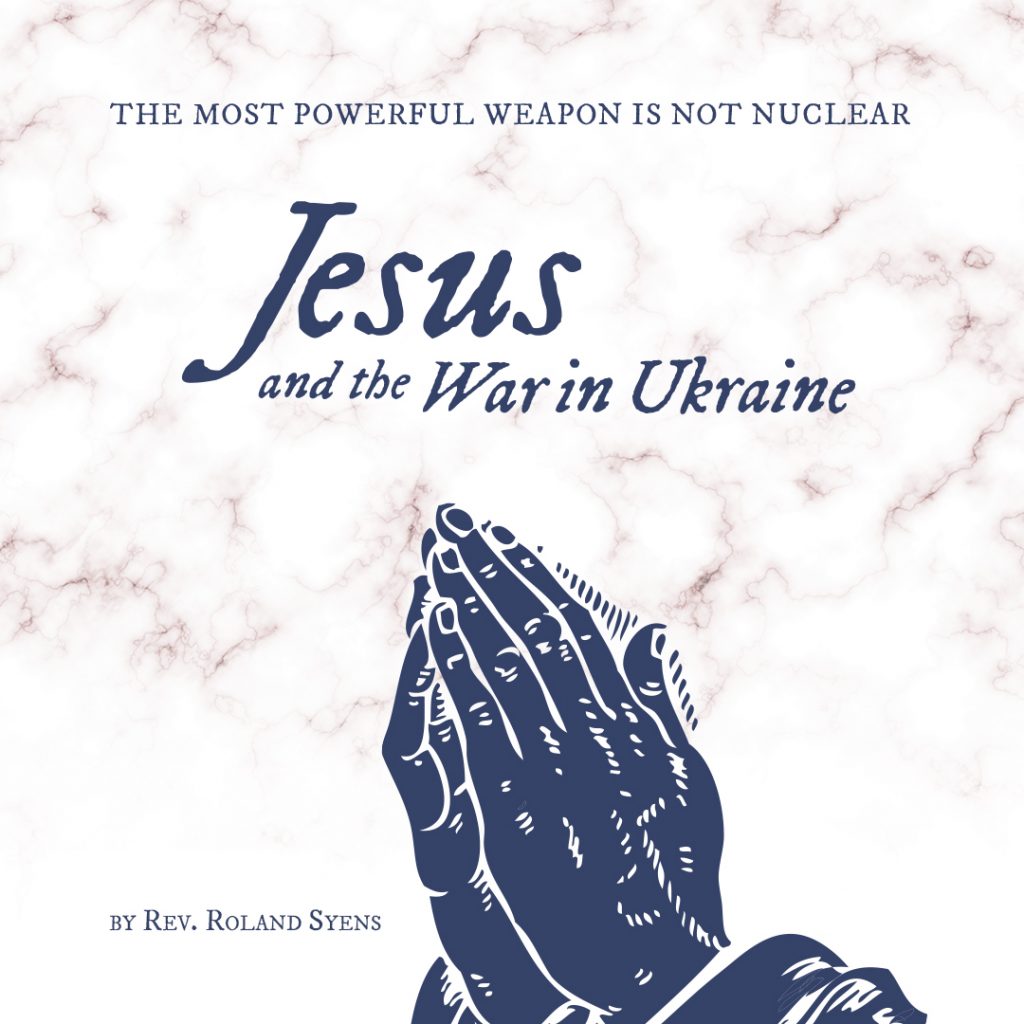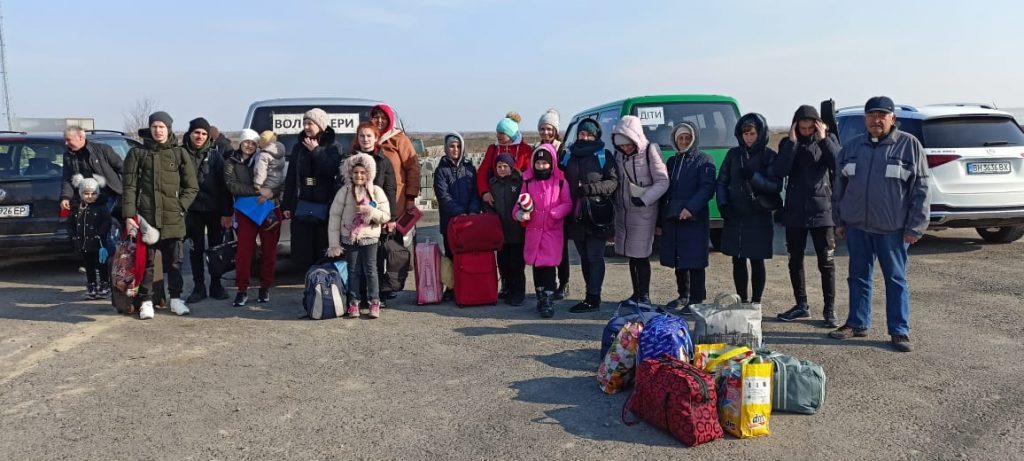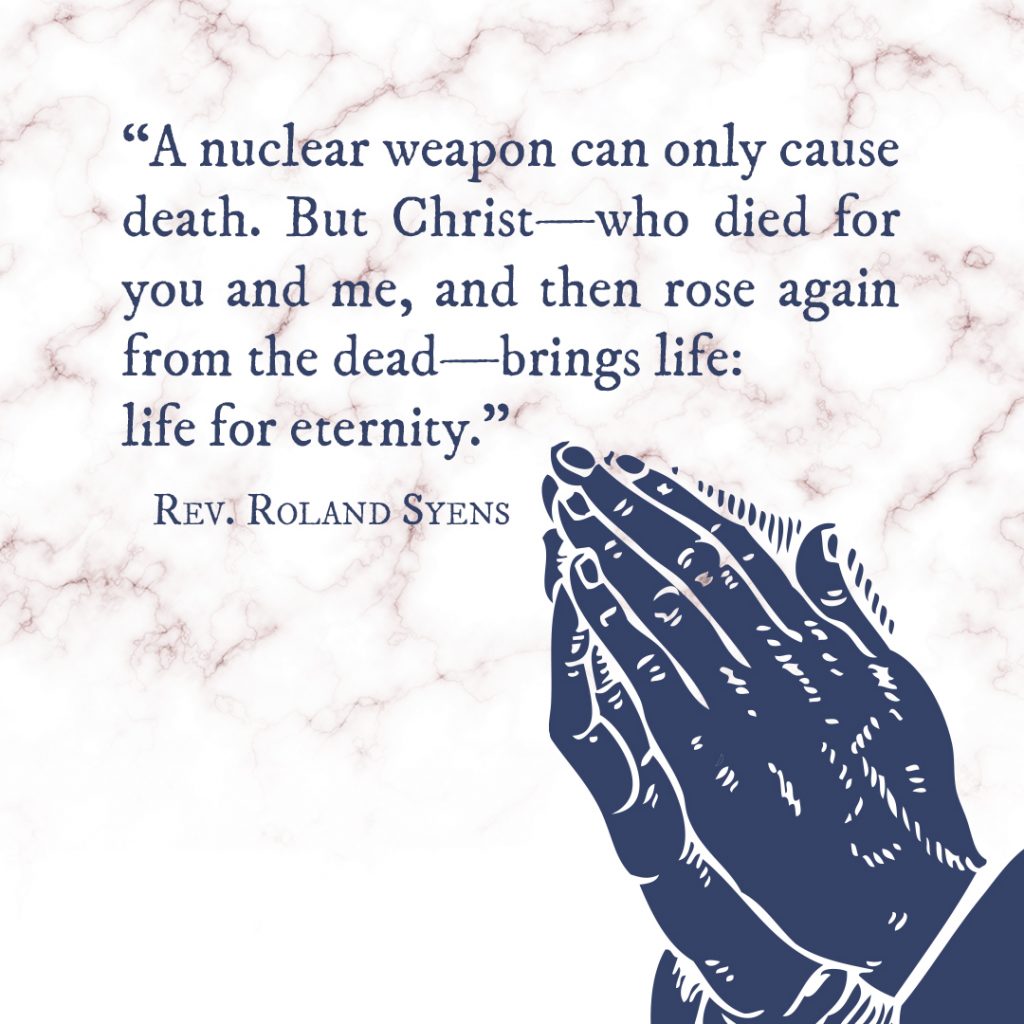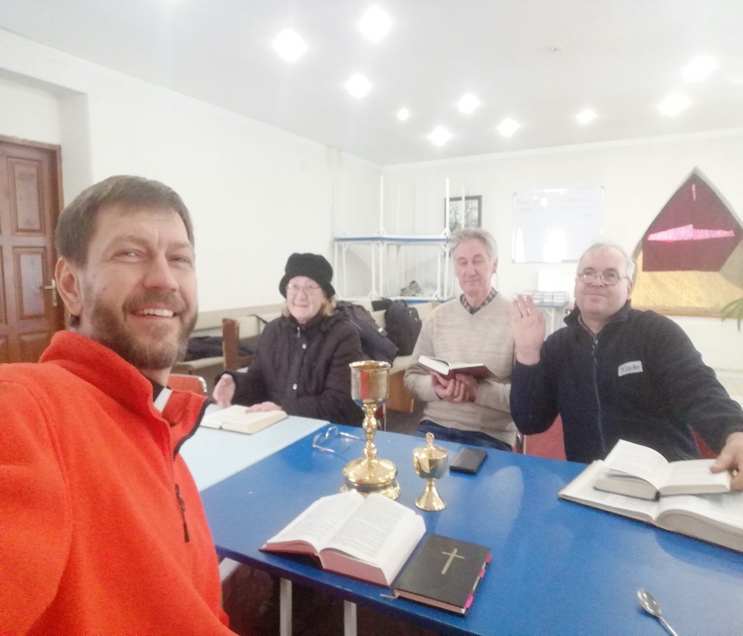The most powerful weapon is not nuclear: Jesus and the War in Ukraine
 by Roland Syens
by Roland Syens
I had the privilege of serving Lutheran Church–Canada as her missionary to Ukraine from 1993-2005. After receiving a call back in Canada to serve as an Assistant Pastor in Kitchener, Ontario, the congregation there graciously allowed my wife, Anita, and me to return to Ukraine almost every year to continue to support and be encouraged by the mission there. We served the Lord by working with the Alpha and Omega Christian Student Society’s many university students (some of whom now live in different countries) and with our partner church, the Synod of Evangelical Lutheran Churches in Ukraine (SELCU).
I connect daily with our Ukrainian pastors as they struggle, with broken hearts, to care for their families, congregation members, and others during the Russian-imposed war on Ukraine. They serve in many ways: by transporting refugees to the borders, finding and delivering food to those in need, providing shelter for those fleeing the war, and sharing the life-giving message of the Gospel in many other ways of incarnational ministry. My wife and I struggle with broken hearts and tears as we see the needless destruction, horrific deaths, and millions of displaced people. It is heartbreaking to see husbands and fathers send their wives and families off to another country, not knowing if they will ever see each other again. Our hearts are breaking.
If the situation we see in Ukraine were to happen in Canada—if you had to make the life and death decision to stay or to flee—what would you do? How would you react?
Without understanding God and His Word—His Story which makes sense of our story—we can fool ourselves into believing that, with all our education and cultural advancements, we have left war far behind.
These are the questions facing Ukrainians on a daily basis. And alongside them is another: where is God in all of this?
Our Ukrainian pastors find themselves counselling soldiers and others that pass through the shelter of their churches, giving them the opportunity to share that God is with them. He is right here in our midst, and He too is brokenhearted. He is the grieving Christ. He did not cause this war to happen; this is not His doing. There is a deeper problem at work and it is in the heart of man. It is a problem humankind has faced since the very beginning when Adam and Eve chose to do things their own way. Their perfect relationship with God was broken, and then sin, death, and evil entered into the world.
Sometimes we forget the fact that we are sinners and that this world is a broken place. Without understanding God and His Word—His Story which makes sense of our story—we can fool ourselves into believing that, with all our education and cultural advancements, we have left war far behind. We are amazed then to see what is happening now in Ukraine and its ripples affecting all of Europe and the rest of the world. But God’s Word helps us understand that the origin of the war in Ukraine is sin.
A world without God is a world without hope—a world that has forgotten the real truth.
In 1948, during the communist era, Anatoly (Natan) Sharansky was born in Donetsk, Ukraine. Sharansky was a brilliant man who received his degree in applied mathematics from the Moscow Institute of Physics and Technology. Because of disagreements with communism, he later spent thirteen years in a Russian prison. Much of that time was spend in solitary confinement, but it was here that he first encountered the Word of God. His wife had sent him a small copy of the book of Psalms from Israel. In prison, he began to work through it, finding unexpected comfort—unexpected truth—in its words.
Prior to his arrest, Sharansky had served as an English interpreter for Andrei Sakharov—the nuclear physicist who became famous first by giving Russia the hydrogen bomb in the 1940s and then by becoming an activist for disarmament, winning the Noble Peace prize in 1975. Sharansky and Sakharov became good friends. Years later in 1997, Sharansky would visit the grave of Sakharov, and remember words from one of his final speeches: “I always assumed that the most powerful weapon in the world was the nuclear bomb, but I have since changed my mind. The most powerful weapon in the world is truth!”
As Christians, we know the truth—or rather, the Truth, for it was Jesus who said: “I am the Way and the Truth and the Life. No one comes to the Father except through Me” (John 14:6). And because we know the Truth, we can find comfort even in the midst of the horror and pain of war. “Let not your hearts be troubled,” Jesus says. “Believe in God; believe also in me (John 14:1).
We often lose hope because we lose sight of who God is and what He done for us. A Ukrainian pastor shared with me that he had long prayed for his church to grow and for people to come to believe in Jesus—but it was heartbreaking to see so few respond in faith to the Gospel. Now, however, in the midst of this horrific war, he sees people are open to his words. They want to know where to find hope—to know what remains when everything else is gone. He tells them that we are all fallen and sinful, something which manifests itself in broken relationships, pain, suffering, wars, and death. God knows this, and He came to this earth in the form of a man, Jesus. He did not run away from pain and suffering, betrayal and death. No, He came specifically to die for our sins—to take our place and exchange His perfection for our sin, to make us right with God.
 This is the Jesus who knows our pain, sorrow, and grief. This is the Jesus who comes alongside us as the grieving Christ. He knows. He hurts. He sees our tears and pain. That is why He came—to take all that pain upon Himself and provide us a way out. And though we still grieve, He grieves with us.
This is the Jesus who knows our pain, sorrow, and grief. This is the Jesus who comes alongside us as the grieving Christ. He knows. He hurts. He sees our tears and pain. That is why He came—to take all that pain upon Himself and provide us a way out. And though we still grieve, He grieves with us.
Jesus is the Truth. And the truth of God’s love for us is more powerful than any nuclear weapon. A nuclear weapon can only cause death. But Christ—who died for you and me, and then rose again from the dead—brings life: life for eternity.
Too often we pin our hopes on false messiahs, those who might bring satisfaction for a moment but in the long run have nothing to offer. But in times like we are experiencing now, when war takes away everything… or when we deal with cancer and illness… or grieve the loss of loved ones… in times like these, when we look death in the face, what can we hang on to? What is it that lasts? What remains true when everything else fails and we fall?
It is the risen Christ. It is His Easter joy that carries us to the other side. It is the grieving Christ who wins salvation for us and leads us in joy to the celebrating Christ.
Our pastors in Ukraine are experiencing great heartbreak. They and their families often run out of tears. But they also have the wonderful joy of sharing the only hope that people have when everything is taken away: God’s saving love for them in Jesus. That puts everything into perspective.
 I had the privilege of sharing the Gospel throughout Ukraine alongside our partner church’s pastors. I remember just a few weeks ago talking to a family who, at one time, were against our sharing Christ in their village. My wife is a hairdresser and would offer to cut hair in the village. When I led a Bible Study for students, she would cut hair for the teachers and adults; and when I would lead Bible Study for the teachers and adults, she would cut hair for the students. One local boy was learning English but was not allowed to come to the Bible Study; his parents did not want him to be exposed to Christian teaching. But when my wife cut hair, he was allowed to translate for her to improve his English.
I had the privilege of sharing the Gospel throughout Ukraine alongside our partner church’s pastors. I remember just a few weeks ago talking to a family who, at one time, were against our sharing Christ in their village. My wife is a hairdresser and would offer to cut hair in the village. When I led a Bible Study for students, she would cut hair for the teachers and adults; and when I would lead Bible Study for the teachers and adults, she would cut hair for the students. One local boy was learning English but was not allowed to come to the Bible Study; his parents did not want him to be exposed to Christian teaching. But when my wife cut hair, he was allowed to translate for her to improve his English.
Over time, he was eventually allowed to come to the Bible Class, and he responded in faith to the Gospel. As more time passed, so did his parents and brother. Now, both boys are married with families who also believe in Jesus. When Ukraine was invaded, they were afraid they would all be separated. But the family of my wife’s translator and his parents were able to stay together in their village. His other brother and his family left for Poland a day before the invasion, and they were safe. As we spoke with the family who remained, the mother of the boy who once served as my wife’s translator asked to speak to my wife. She said: “Thank you and Roland for sharing Jesus with us. Thank you because we are all together and our whole family knows Jesus. If a bomb goes off and we are all killed, we will still all be together with our Jesus in heaven. Thank you.”
Throughout this time of war in Ukraine, we grieve what Christ grieves: the loss, the destruction, the broken lives, the hurt, and pain caused by sin and evil. But there is hope. God gives hope.
Throughout this time of war in Ukraine, we grieve what Christ grieves: the loss, the destruction, the broken lives, the hurt, and pain caused by sin and evil. But there is hope. God gives hope.
We are reminded in our Lenten journey that Jesus took the way of suffering, pain, and death to give us life. He died the death we should have died. He took the sin of the whole world upon Himself on the cross to free us from that sin. We are not promised a life here without pain, suffering, hurt, or brokenness. We are not promised a life without war and catastrophe. But even in our grief, we are not alone—for Christ grieves these things with us.

Rev. Oleksiy Navrotskyy, LCC Missionary in Ukraine, shared this photo upon finally having opportunity to deliver food and medicine to members of his own congregation, and to share God’s Word and Holy Communion with them. Many are afraid to go out because of air raid alerts and the sound of explosions, so much of their communication has had to be via phone or messenger.
In the end, however, we know that grief does not get the final word. Jesus did not stay on the cross. He paid the price of our sin and rose again, proclaiming victory over sin, death, and the devil. This is the truth that God brings to us as we struggle and suffer and grieve. He has won the ultimate victory and gives to us this victory so that we can celebrate what Christ celebrates. This is Easter victory! This is life on the other side of the cross. It is a celebration for eternity.
The most powerful weapon in the world is not nuclear. It is the truth—the truth found in Jesus, who is the Way the Truth and the Life. Every single person—you and I and everyone else—can receive new life in God through Jesus. That changes everything. In the end, that is all we need. Yes, there is hope. Even in war, sickness, and the face of death, God gives hope in Jesus. So, we grieve what Christ grieves and celebrate what Christ celebrates: new life in Him—the Way, the Truth, and the Life.
———————
Rev. Roland Syens served as a missionary pastor in Ukraine for Lutheran Church–Canada from 1993-2005. He subsequently served as Assistant Pastor at Holy Cross Lutheran Church in Kitchener, Ontario until his retirement in 2020.



